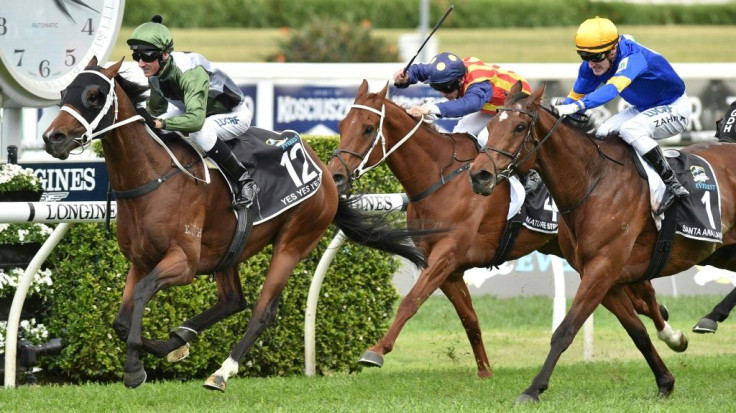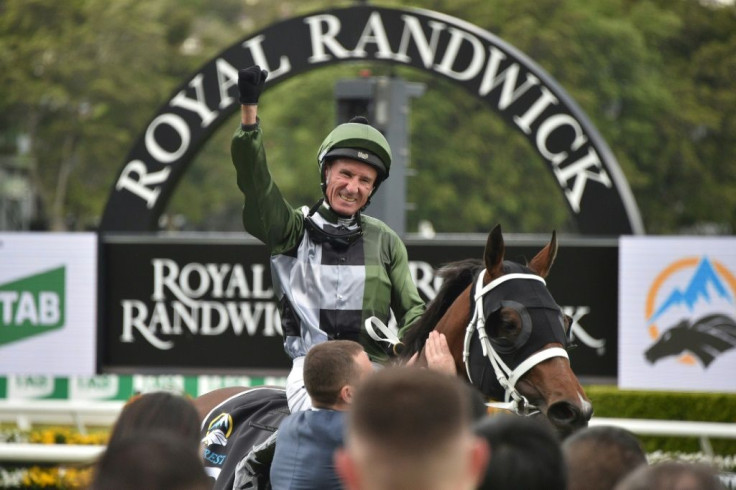Yes Yes Yes Wins Turf Racing's Biggest Prize, The Everest
Yes Yes Yes, trained by Chris Waller who steered Winx on an incredible, unbeaten 33-race run, stunned favourite Santa Ana Lane to win the world's richest turf, The Everest, in Sydney Saturday.
With jockey Glen Boss in the saddle, the three-year-old colt collected a whopping Aus$6.05 million (US$4.13 million) for barely a one-minute sprint.
On a glorious day, Santa Ana Lane was second and Trekking third in front of some 40,000 people at Royal Randwick, who put aside revelations this week detailing the shocking fate of thousands of retired racehorses.
While slaughtering racehorses, as opposed to rehoming them, is not illegal in Australia, a two-year undercover probe by the Australian Broadcasting Corporation alleged the practice was far more widespread than acknowledged.
It detailed healthy horses being brutalised at one abattoir before being killed on an "industrial scale", with their meat shipped overseas for human and pet consumption, sending shockwaves through the industry.

The scandal cast a shadow over The Everest, but it didn't deter the punters who turned out en masse for one of the biggest events on the global racing calendar.
"I promise you, that was one hell of an experience," said an ecstatic Boss.
"It was very surreal. I had a plan in my head about what I wanted to do and Chris was in my corner on how I wanted to ride the horse."
Nature Strip, part-owned by All Blacks coach Steve Hansen and also trained by Waller, led for most of the race until Yes Yes Yes and Santa Ana Lane powered past in the dying stages.
Seven-year-old Redzel, which won the first two Everests and was again ridden by Kerrin McEvoy, finished eighth. Nature Strip came fourth.
"What I'm getting emotional about is the ride she took us on," said Waller, close to tears after his biggest win since the mighty Winx, considered perhaps the greatest racehorse ever, retired earlier this year.

Riches at stake
Since its inception in 2017, The Everest has progressively boosted prizemoney from its initial Aus$10 million to Aus$14 million this year.
Even the horse that came last, Ten Sovereigns, walked away with Aus$400,000, with the cash bonanza easily topping the pool offered at the Melbourne Cup, which has been run on the first Tuesday in November since 1876.
Raced over 1200 metres (3/4 mile or six furlongs), it brought together 12 of the world's best sprinters boasting countless titles under weight-for-age conditions.
Under an innovative concept, buyers are required to purchase a Aus$600,000 slot in the race and commit for three years, then do a deal with owners and jockeys to secure the top horses.
The idea for The Everest came from Racing NSW chief executive Peter V'landys, who modelled it on the Pegasus World Cup in the United States, run over 1800m.
But it has been controversial with Racing NSW and the Australian Turf Club scheduling it in Sydney to clash with the Caulfield Cup meeting in Melbourne.
And while it has caught the imagination, the lead-up this year was marred by the scandal surrounding the fate of retired horses.
A push for a national traceability register has been stepped up in the aftermath, which would allow authorities to better track changes in ownership, and locations, of racehorses when they leave the industry.
Waller said a small minority were letting down the majority with their treatment of horses.
"We've got to be accountable as to every horse that leaves our stable but obviously there's gaps that need looking at," he said.
"And if people that are harsh to animals, whether they be a racehorse or whether they be a hobby horse or any animal for that matter, they need to be dealt with."
© Copyright AFP 2024. All rights reserved.





















